Analyzing Organizational Behavior: A BBC Case Study Report
VerifiedAdded on 2020/11/12
|15
|5037
|305
Report
AI Summary
This report provides an in-depth analysis of organizational behavior within the British Broadcasting Corporation (BBC). It examines the influence of organizational culture, power dynamics, and political factors on individual and team behaviors and performance. The report highlights how BBC faced challenges due to an autocratic culture and internal politics, which led to employee turnover. It discusses the impact of power culture and the shift towards a more people-focused approach under a new HR director, including changes in HR policies and the promotion of a participative culture. The report further explores the application of content and process theories of motivation, such as Maslow's hierarchy of needs and Vroom's expectancy theory, to understand employee motivation and goal achievement within BBC. It also examines the factors that contribute to effective and ineffective teams, and applies concepts of organizational behavior within the context of BBC's operations and strategic priorities.
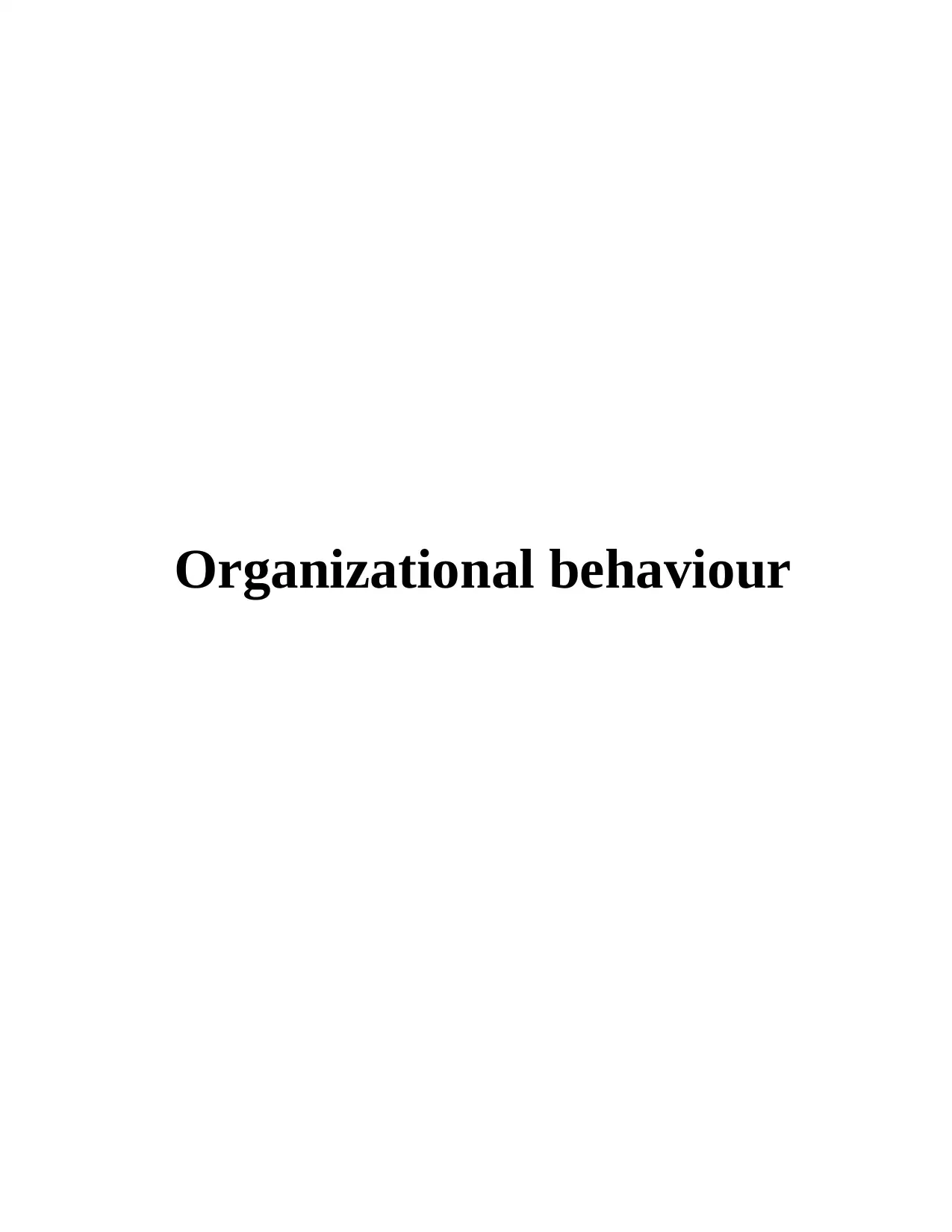
Organizational behaviour
Paraphrase This Document
Need a fresh take? Get an instant paraphrase of this document with our AI Paraphraser
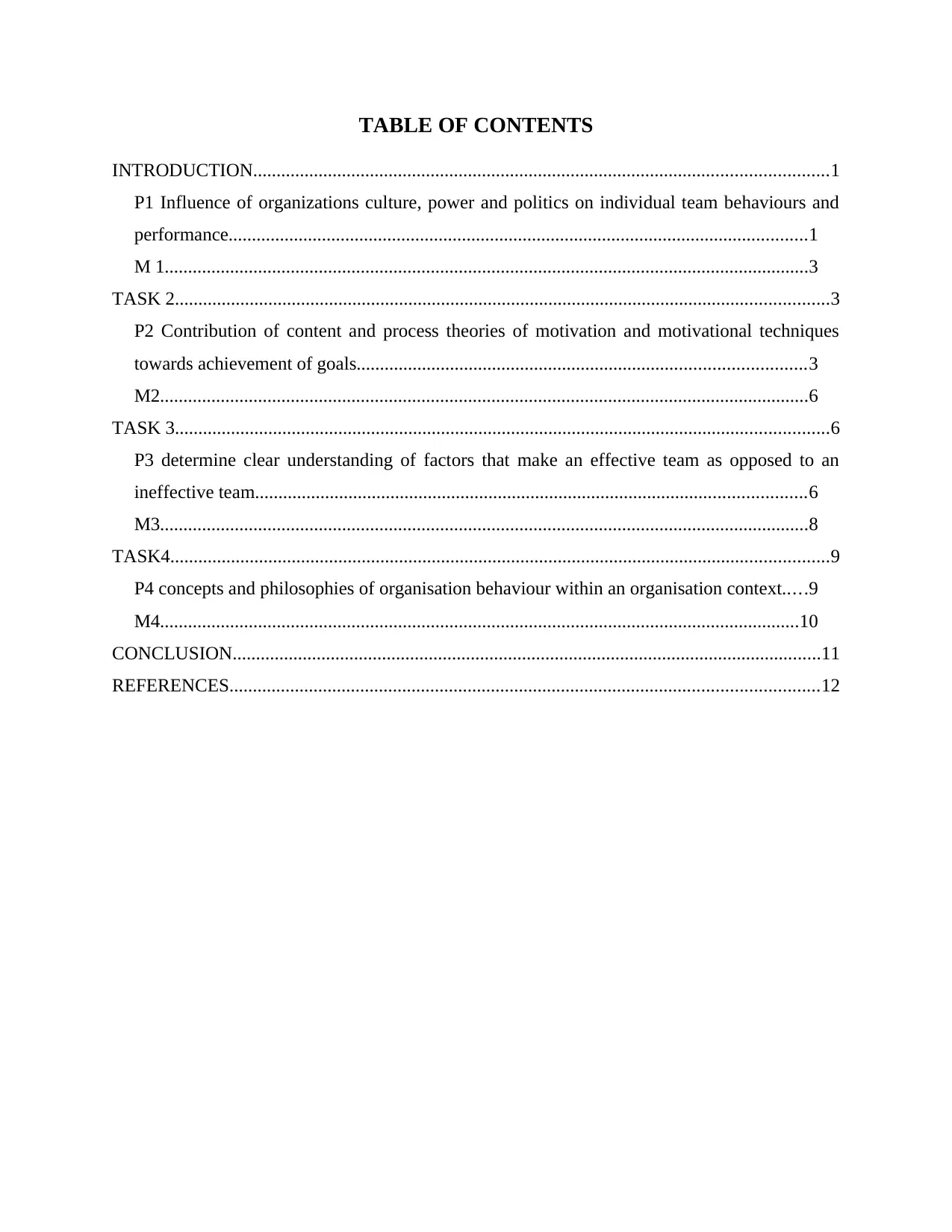
TABLE OF CONTENTS
INTRODUCTION...........................................................................................................................1
P1 Influence of organizations culture, power and politics on individual team behaviours and
performance............................................................................................................................1
M 1..........................................................................................................................................3
TASK 2............................................................................................................................................3
P2 Contribution of content and process theories of motivation and motivational techniques
towards achievement of goals................................................................................................3
M2...........................................................................................................................................6
TASK 3............................................................................................................................................6
P3 determine clear understanding of factors that make an effective team as opposed to an
ineffective team......................................................................................................................6
M3...........................................................................................................................................8
TASK4.............................................................................................................................................9
P4 concepts and philosophies of organisation behaviour within an organisation context.....9
M4.........................................................................................................................................10
CONCLUSION..............................................................................................................................11
REFERENCES..............................................................................................................................12
INTRODUCTION...........................................................................................................................1
P1 Influence of organizations culture, power and politics on individual team behaviours and
performance............................................................................................................................1
M 1..........................................................................................................................................3
TASK 2............................................................................................................................................3
P2 Contribution of content and process theories of motivation and motivational techniques
towards achievement of goals................................................................................................3
M2...........................................................................................................................................6
TASK 3............................................................................................................................................6
P3 determine clear understanding of factors that make an effective team as opposed to an
ineffective team......................................................................................................................6
M3...........................................................................................................................................8
TASK4.............................................................................................................................................9
P4 concepts and philosophies of organisation behaviour within an organisation context.....9
M4.........................................................................................................................................10
CONCLUSION..............................................................................................................................11
REFERENCES..............................................................................................................................12
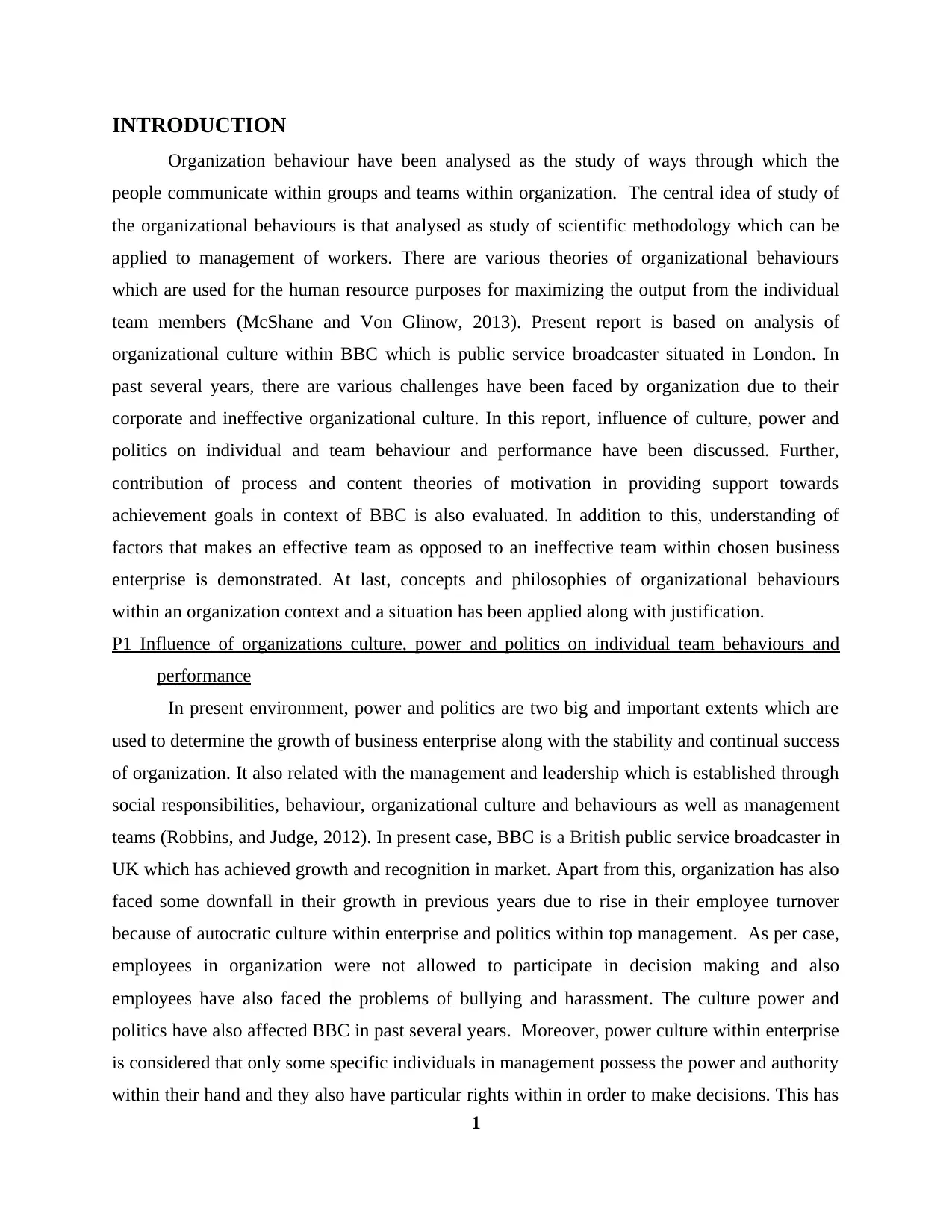
INTRODUCTION
Organization behaviour have been analysed as the study of ways through which the
people communicate within groups and teams within organization. The central idea of study of
the organizational behaviours is that analysed as study of scientific methodology which can be
applied to management of workers. There are various theories of organizational behaviours
which are used for the human resource purposes for maximizing the output from the individual
team members (McShane and Von Glinow, 2013). Present report is based on analysis of
organizational culture within BBC which is public service broadcaster situated in London. In
past several years, there are various challenges have been faced by organization due to their
corporate and ineffective organizational culture. In this report, influence of culture, power and
politics on individual and team behaviour and performance have been discussed. Further,
contribution of process and content theories of motivation in providing support towards
achievement goals in context of BBC is also evaluated. In addition to this, understanding of
factors that makes an effective team as opposed to an ineffective team within chosen business
enterprise is demonstrated. At last, concepts and philosophies of organizational behaviours
within an organization context and a situation has been applied along with justification.
P1 Influence of organizations culture, power and politics on individual team behaviours and
performance
In present environment, power and politics are two big and important extents which are
used to determine the growth of business enterprise along with the stability and continual success
of organization. It also related with the management and leadership which is established through
social responsibilities, behaviour, organizational culture and behaviours as well as management
teams (Robbins, and Judge, 2012). In present case, BBC is a British public service broadcaster in
UK which has achieved growth and recognition in market. Apart from this, organization has also
faced some downfall in their growth in previous years due to rise in their employee turnover
because of autocratic culture within enterprise and politics within top management. As per case,
employees in organization were not allowed to participate in decision making and also
employees have also faced the problems of bullying and harassment. The culture power and
politics have also affected BBC in past several years. Moreover, power culture within enterprise
is considered that only some specific individuals in management possess the power and authority
within their hand and they also have particular rights within in order to make decisions. This has
1
Organization behaviour have been analysed as the study of ways through which the
people communicate within groups and teams within organization. The central idea of study of
the organizational behaviours is that analysed as study of scientific methodology which can be
applied to management of workers. There are various theories of organizational behaviours
which are used for the human resource purposes for maximizing the output from the individual
team members (McShane and Von Glinow, 2013). Present report is based on analysis of
organizational culture within BBC which is public service broadcaster situated in London. In
past several years, there are various challenges have been faced by organization due to their
corporate and ineffective organizational culture. In this report, influence of culture, power and
politics on individual and team behaviour and performance have been discussed. Further,
contribution of process and content theories of motivation in providing support towards
achievement goals in context of BBC is also evaluated. In addition to this, understanding of
factors that makes an effective team as opposed to an ineffective team within chosen business
enterprise is demonstrated. At last, concepts and philosophies of organizational behaviours
within an organization context and a situation has been applied along with justification.
P1 Influence of organizations culture, power and politics on individual team behaviours and
performance
In present environment, power and politics are two big and important extents which are
used to determine the growth of business enterprise along with the stability and continual success
of organization. It also related with the management and leadership which is established through
social responsibilities, behaviour, organizational culture and behaviours as well as management
teams (Robbins, and Judge, 2012). In present case, BBC is a British public service broadcaster in
UK which has achieved growth and recognition in market. Apart from this, organization has also
faced some downfall in their growth in previous years due to rise in their employee turnover
because of autocratic culture within enterprise and politics within top management. As per case,
employees in organization were not allowed to participate in decision making and also
employees have also faced the problems of bullying and harassment. The culture power and
politics have also affected BBC in past several years. Moreover, power culture within enterprise
is considered that only some specific individuals in management possess the power and authority
within their hand and they also have particular rights within in order to make decisions. This has
1
⊘ This is a preview!⊘
Do you want full access?
Subscribe today to unlock all pages.

Trusted by 1+ million students worldwide
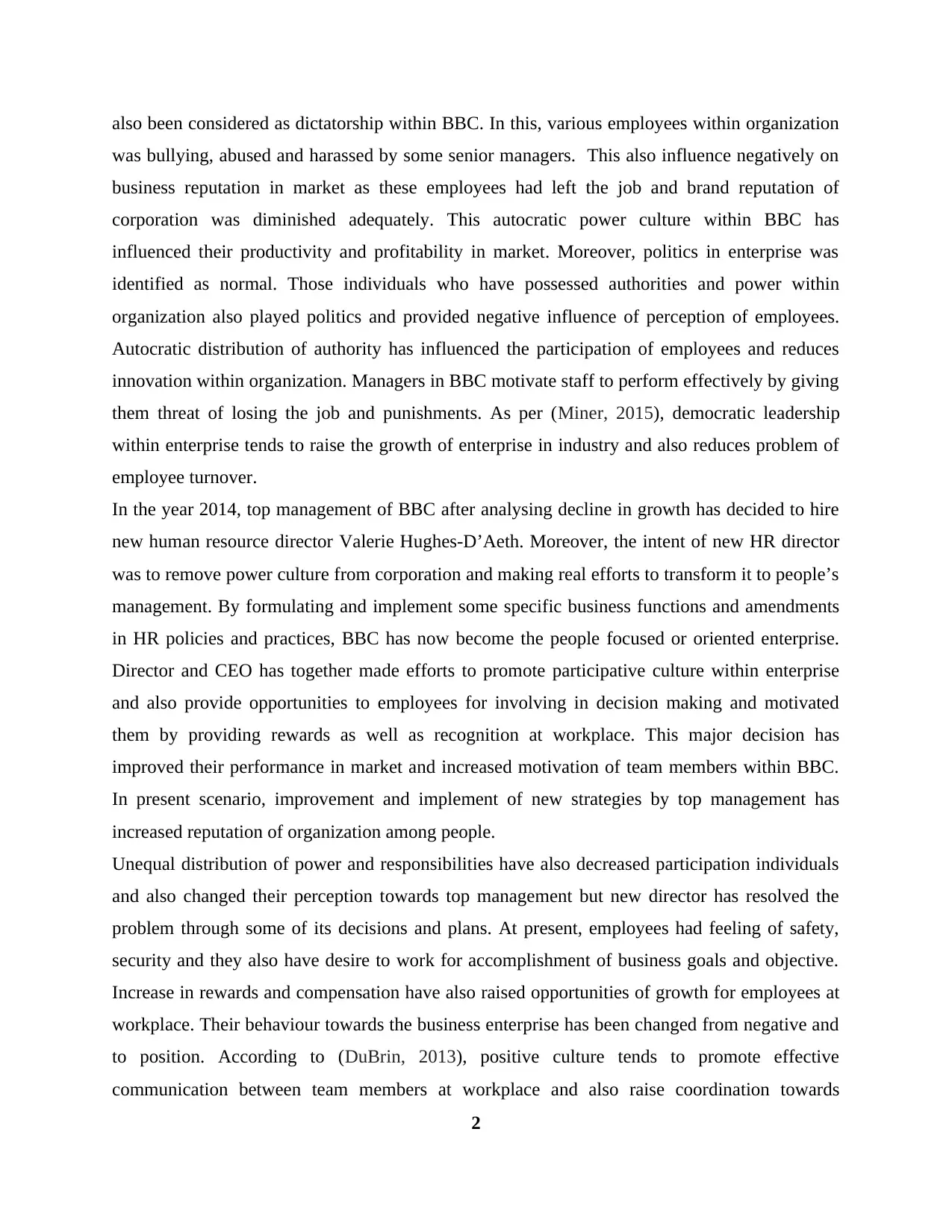
also been considered as dictatorship within BBC. In this, various employees within organization
was bullying, abused and harassed by some senior managers. This also influence negatively on
business reputation in market as these employees had left the job and brand reputation of
corporation was diminished adequately. This autocratic power culture within BBC has
influenced their productivity and profitability in market. Moreover, politics in enterprise was
identified as normal. Those individuals who have possessed authorities and power within
organization also played politics and provided negative influence of perception of employees.
Autocratic distribution of authority has influenced the participation of employees and reduces
innovation within organization. Managers in BBC motivate staff to perform effectively by giving
them threat of losing the job and punishments. As per (Miner, 2015), democratic leadership
within enterprise tends to raise the growth of enterprise in industry and also reduces problem of
employee turnover.
In the year 2014, top management of BBC after analysing decline in growth has decided to hire
new human resource director Valerie Hughes-D’Aeth. Moreover, the intent of new HR director
was to remove power culture from corporation and making real efforts to transform it to people’s
management. By formulating and implement some specific business functions and amendments
in HR policies and practices, BBC has now become the people focused or oriented enterprise.
Director and CEO has together made efforts to promote participative culture within enterprise
and also provide opportunities to employees for involving in decision making and motivated
them by providing rewards as well as recognition at workplace. This major decision has
improved their performance in market and increased motivation of team members within BBC.
In present scenario, improvement and implement of new strategies by top management has
increased reputation of organization among people.
Unequal distribution of power and responsibilities have also decreased participation individuals
and also changed their perception towards top management but new director has resolved the
problem through some of its decisions and plans. At present, employees had feeling of safety,
security and they also have desire to work for accomplishment of business goals and objective.
Increase in rewards and compensation have also raised opportunities of growth for employees at
workplace. Their behaviour towards the business enterprise has been changed from negative and
to position. According to (DuBrin, 2013), positive culture tends to promote effective
communication between team members at workplace and also raise coordination towards
2
was bullying, abused and harassed by some senior managers. This also influence negatively on
business reputation in market as these employees had left the job and brand reputation of
corporation was diminished adequately. This autocratic power culture within BBC has
influenced their productivity and profitability in market. Moreover, politics in enterprise was
identified as normal. Those individuals who have possessed authorities and power within
organization also played politics and provided negative influence of perception of employees.
Autocratic distribution of authority has influenced the participation of employees and reduces
innovation within organization. Managers in BBC motivate staff to perform effectively by giving
them threat of losing the job and punishments. As per (Miner, 2015), democratic leadership
within enterprise tends to raise the growth of enterprise in industry and also reduces problem of
employee turnover.
In the year 2014, top management of BBC after analysing decline in growth has decided to hire
new human resource director Valerie Hughes-D’Aeth. Moreover, the intent of new HR director
was to remove power culture from corporation and making real efforts to transform it to people’s
management. By formulating and implement some specific business functions and amendments
in HR policies and practices, BBC has now become the people focused or oriented enterprise.
Director and CEO has together made efforts to promote participative culture within enterprise
and also provide opportunities to employees for involving in decision making and motivated
them by providing rewards as well as recognition at workplace. This major decision has
improved their performance in market and increased motivation of team members within BBC.
In present scenario, improvement and implement of new strategies by top management has
increased reputation of organization among people.
Unequal distribution of power and responsibilities have also decreased participation individuals
and also changed their perception towards top management but new director has resolved the
problem through some of its decisions and plans. At present, employees had feeling of safety,
security and they also have desire to work for accomplishment of business goals and objective.
Increase in rewards and compensation have also raised opportunities of growth for employees at
workplace. Their behaviour towards the business enterprise has been changed from negative and
to position. According to (DuBrin, 2013), positive culture tends to promote effective
communication between team members at workplace and also raise coordination towards
2
Paraphrase This Document
Need a fresh take? Get an instant paraphrase of this document with our AI Paraphraser
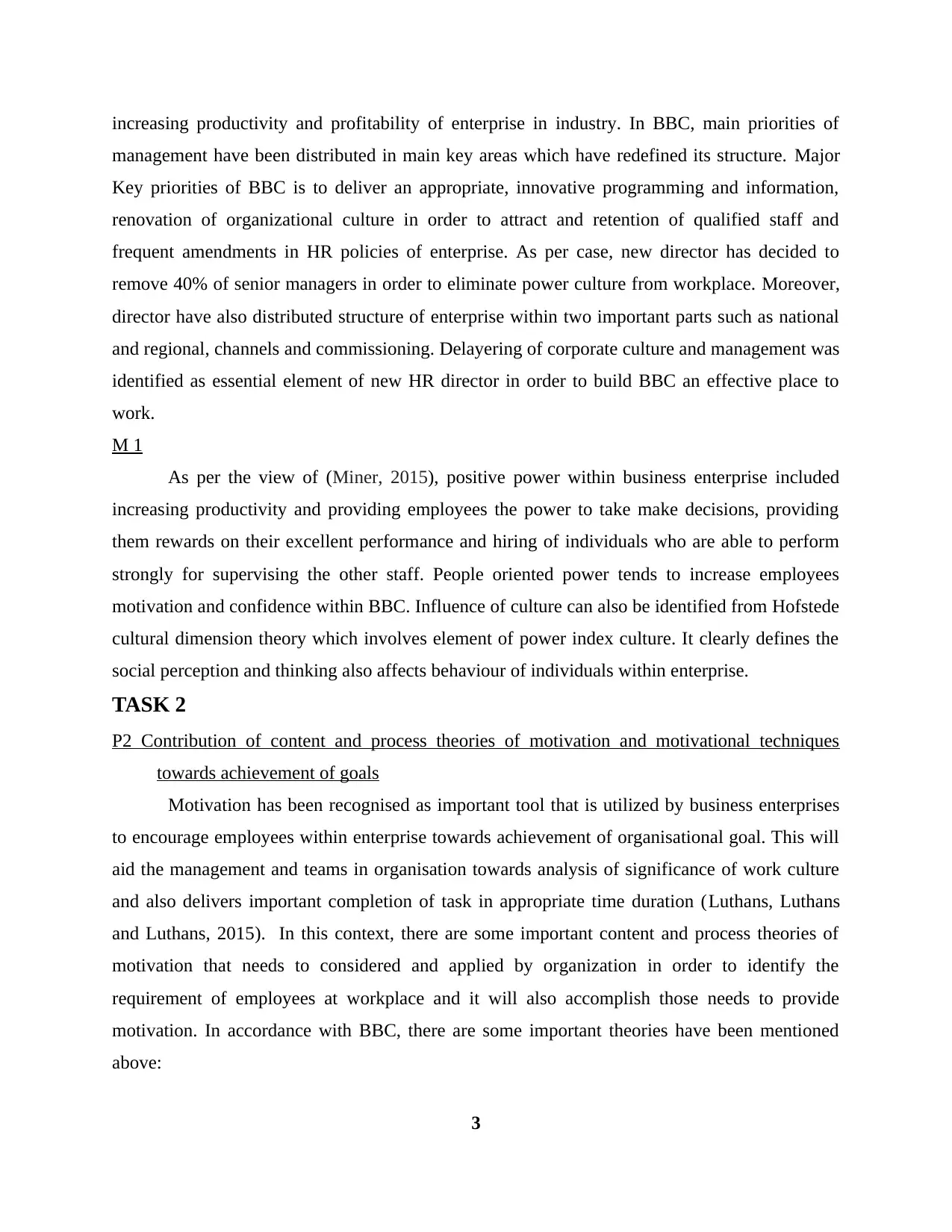
increasing productivity and profitability of enterprise in industry. In BBC, main priorities of
management have been distributed in main key areas which have redefined its structure. Major
Key priorities of BBC is to deliver an appropriate, innovative programming and information,
renovation of organizational culture in order to attract and retention of qualified staff and
frequent amendments in HR policies of enterprise. As per case, new director has decided to
remove 40% of senior managers in order to eliminate power culture from workplace. Moreover,
director have also distributed structure of enterprise within two important parts such as national
and regional, channels and commissioning. Delayering of corporate culture and management was
identified as essential element of new HR director in order to build BBC an effective place to
work.
M 1
As per the view of (Miner, 2015), positive power within business enterprise included
increasing productivity and providing employees the power to take make decisions, providing
them rewards on their excellent performance and hiring of individuals who are able to perform
strongly for supervising the other staff. People oriented power tends to increase employees
motivation and confidence within BBC. Influence of culture can also be identified from Hofstede
cultural dimension theory which involves element of power index culture. It clearly defines the
social perception and thinking also affects behaviour of individuals within enterprise.
TASK 2
P2 Contribution of content and process theories of motivation and motivational techniques
towards achievement of goals
Motivation has been recognised as important tool that is utilized by business enterprises
to encourage employees within enterprise towards achievement of organisational goal. This will
aid the management and teams in organisation towards analysis of significance of work culture
and also delivers important completion of task in appropriate time duration (Luthans, Luthans
and Luthans, 2015). In this context, there are some important content and process theories of
motivation that needs to considered and applied by organization in order to identify the
requirement of employees at workplace and it will also accomplish those needs to provide
motivation. In accordance with BBC, there are some important theories have been mentioned
above:
3
management have been distributed in main key areas which have redefined its structure. Major
Key priorities of BBC is to deliver an appropriate, innovative programming and information,
renovation of organizational culture in order to attract and retention of qualified staff and
frequent amendments in HR policies of enterprise. As per case, new director has decided to
remove 40% of senior managers in order to eliminate power culture from workplace. Moreover,
director have also distributed structure of enterprise within two important parts such as national
and regional, channels and commissioning. Delayering of corporate culture and management was
identified as essential element of new HR director in order to build BBC an effective place to
work.
M 1
As per the view of (Miner, 2015), positive power within business enterprise included
increasing productivity and providing employees the power to take make decisions, providing
them rewards on their excellent performance and hiring of individuals who are able to perform
strongly for supervising the other staff. People oriented power tends to increase employees
motivation and confidence within BBC. Influence of culture can also be identified from Hofstede
cultural dimension theory which involves element of power index culture. It clearly defines the
social perception and thinking also affects behaviour of individuals within enterprise.
TASK 2
P2 Contribution of content and process theories of motivation and motivational techniques
towards achievement of goals
Motivation has been recognised as important tool that is utilized by business enterprises
to encourage employees within enterprise towards achievement of organisational goal. This will
aid the management and teams in organisation towards analysis of significance of work culture
and also delivers important completion of task in appropriate time duration (Luthans, Luthans
and Luthans, 2015). In this context, there are some important content and process theories of
motivation that needs to considered and applied by organization in order to identify the
requirement of employees at workplace and it will also accomplish those needs to provide
motivation. In accordance with BBC, there are some important theories have been mentioned
above:
3
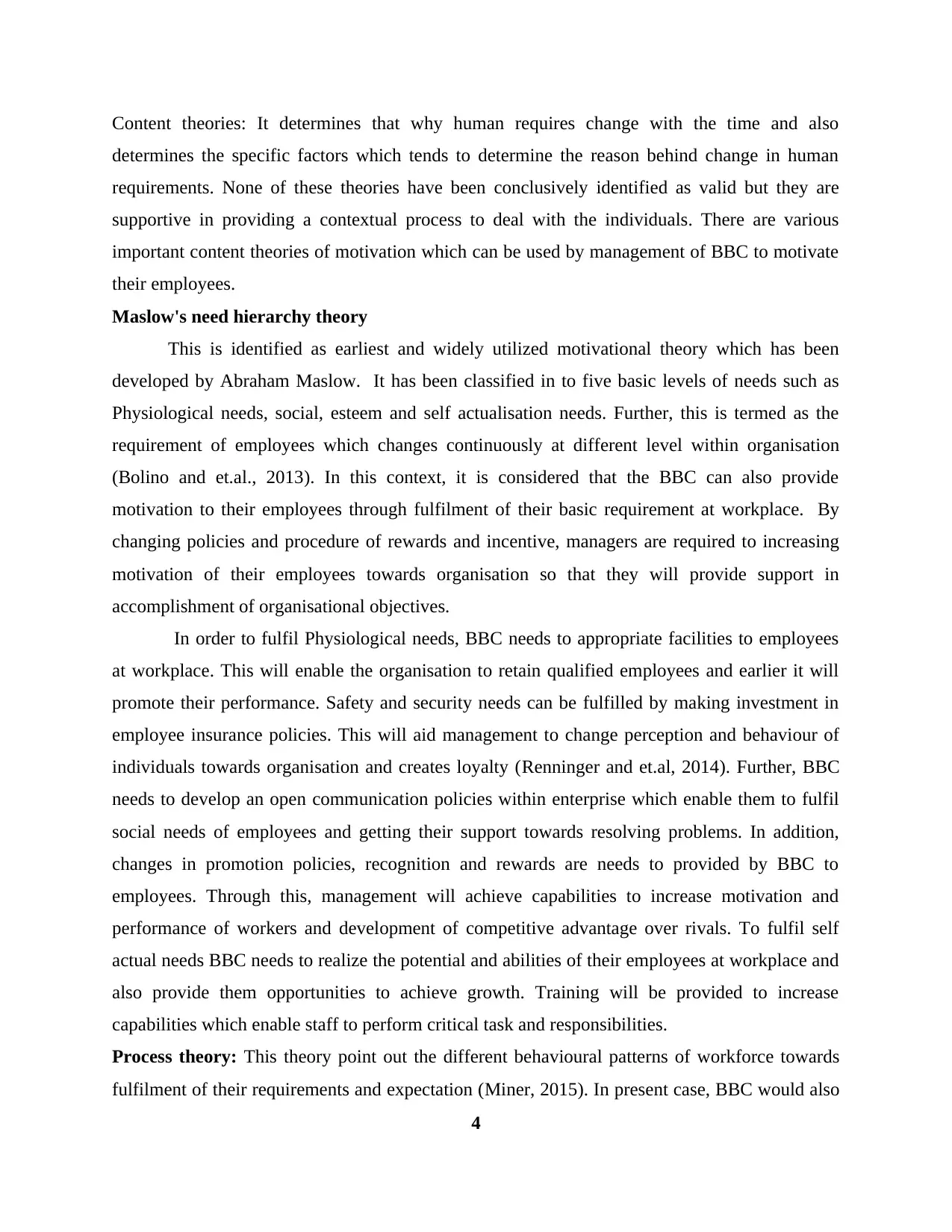
Content theories: It determines that why human requires change with the time and also
determines the specific factors which tends to determine the reason behind change in human
requirements. None of these theories have been conclusively identified as valid but they are
supportive in providing a contextual process to deal with the individuals. There are various
important content theories of motivation which can be used by management of BBC to motivate
their employees.
Maslow's need hierarchy theory
This is identified as earliest and widely utilized motivational theory which has been
developed by Abraham Maslow. It has been classified in to five basic levels of needs such as
Physiological needs, social, esteem and self actualisation needs. Further, this is termed as the
requirement of employees which changes continuously at different level within organisation
(Bolino and et.al., 2013). In this context, it is considered that the BBC can also provide
motivation to their employees through fulfilment of their basic requirement at workplace. By
changing policies and procedure of rewards and incentive, managers are required to increasing
motivation of their employees towards organisation so that they will provide support in
accomplishment of organisational objectives.
In order to fulfil Physiological needs, BBC needs to appropriate facilities to employees
at workplace. This will enable the organisation to retain qualified employees and earlier it will
promote their performance. Safety and security needs can be fulfilled by making investment in
employee insurance policies. This will aid management to change perception and behaviour of
individuals towards organisation and creates loyalty (Renninger and et.al, 2014). Further, BBC
needs to develop an open communication policies within enterprise which enable them to fulfil
social needs of employees and getting their support towards resolving problems. In addition,
changes in promotion policies, recognition and rewards are needs to provided by BBC to
employees. Through this, management will achieve capabilities to increase motivation and
performance of workers and development of competitive advantage over rivals. To fulfil self
actual needs BBC needs to realize the potential and abilities of their employees at workplace and
also provide them opportunities to achieve growth. Training will be provided to increase
capabilities which enable staff to perform critical task and responsibilities.
Process theory: This theory point out the different behavioural patterns of workforce towards
fulfilment of their requirements and expectation (Miner, 2015). In present case, BBC would also
4
determines the specific factors which tends to determine the reason behind change in human
requirements. None of these theories have been conclusively identified as valid but they are
supportive in providing a contextual process to deal with the individuals. There are various
important content theories of motivation which can be used by management of BBC to motivate
their employees.
Maslow's need hierarchy theory
This is identified as earliest and widely utilized motivational theory which has been
developed by Abraham Maslow. It has been classified in to five basic levels of needs such as
Physiological needs, social, esteem and self actualisation needs. Further, this is termed as the
requirement of employees which changes continuously at different level within organisation
(Bolino and et.al., 2013). In this context, it is considered that the BBC can also provide
motivation to their employees through fulfilment of their basic requirement at workplace. By
changing policies and procedure of rewards and incentive, managers are required to increasing
motivation of their employees towards organisation so that they will provide support in
accomplishment of organisational objectives.
In order to fulfil Physiological needs, BBC needs to appropriate facilities to employees
at workplace. This will enable the organisation to retain qualified employees and earlier it will
promote their performance. Safety and security needs can be fulfilled by making investment in
employee insurance policies. This will aid management to change perception and behaviour of
individuals towards organisation and creates loyalty (Renninger and et.al, 2014). Further, BBC
needs to develop an open communication policies within enterprise which enable them to fulfil
social needs of employees and getting their support towards resolving problems. In addition,
changes in promotion policies, recognition and rewards are needs to provided by BBC to
employees. Through this, management will achieve capabilities to increase motivation and
performance of workers and development of competitive advantage over rivals. To fulfil self
actual needs BBC needs to realize the potential and abilities of their employees at workplace and
also provide them opportunities to achieve growth. Training will be provided to increase
capabilities which enable staff to perform critical task and responsibilities.
Process theory: This theory point out the different behavioural patterns of workforce towards
fulfilment of their requirements and expectation (Miner, 2015). In present case, BBC would also
4
⊘ This is a preview!⊘
Do you want full access?
Subscribe today to unlock all pages.

Trusted by 1+ million students worldwide
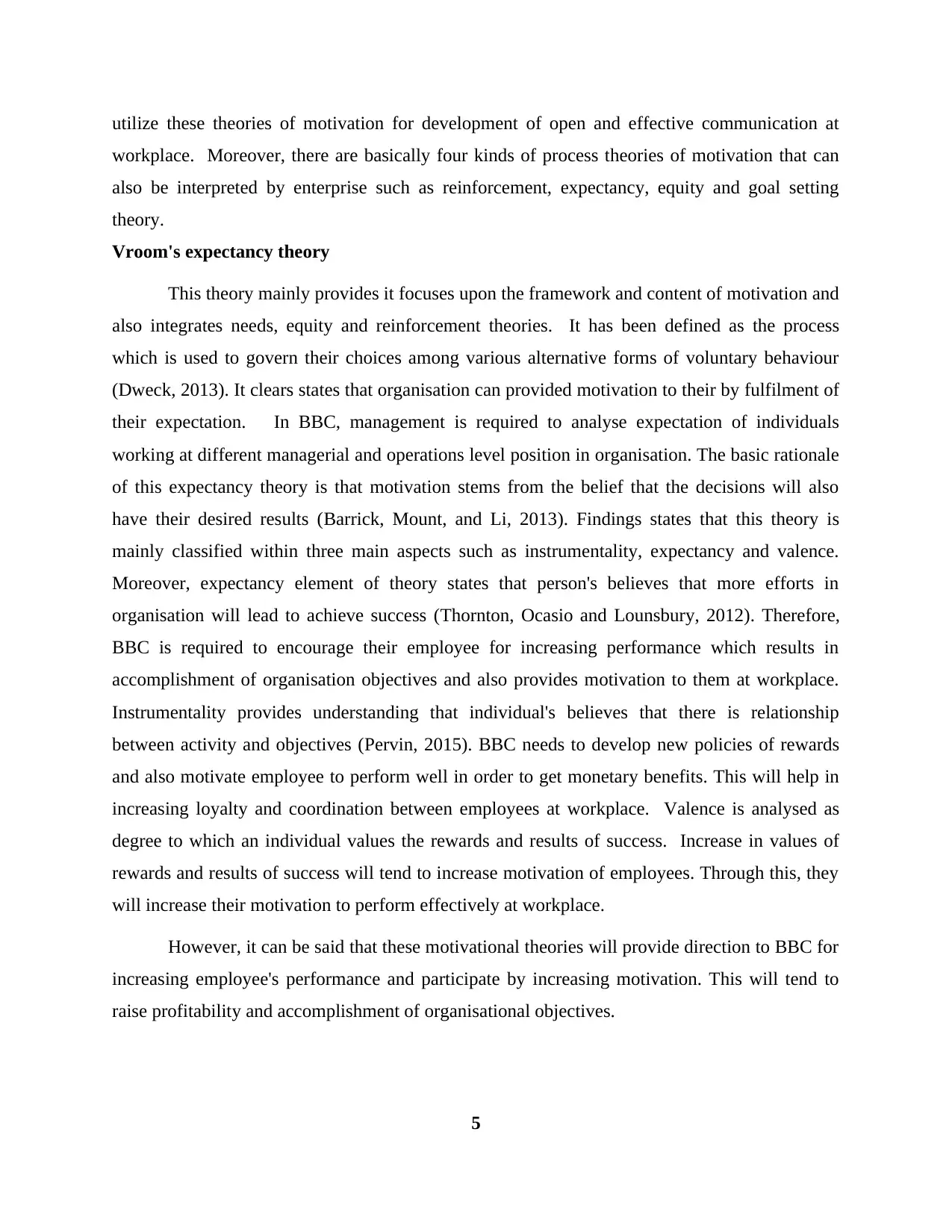
utilize these theories of motivation for development of open and effective communication at
workplace. Moreover, there are basically four kinds of process theories of motivation that can
also be interpreted by enterprise such as reinforcement, expectancy, equity and goal setting
theory.
Vroom's expectancy theory
This theory mainly provides it focuses upon the framework and content of motivation and
also integrates needs, equity and reinforcement theories. It has been defined as the process
which is used to govern their choices among various alternative forms of voluntary behaviour
(Dweck, 2013). It clears states that organisation can provided motivation to their by fulfilment of
their expectation. In BBC, management is required to analyse expectation of individuals
working at different managerial and operations level position in organisation. The basic rationale
of this expectancy theory is that motivation stems from the belief that the decisions will also
have their desired results (Barrick, Mount, and Li, 2013). Findings states that this theory is
mainly classified within three main aspects such as instrumentality, expectancy and valence.
Moreover, expectancy element of theory states that person's believes that more efforts in
organisation will lead to achieve success (Thornton, Ocasio and Lounsbury, 2012). Therefore,
BBC is required to encourage their employee for increasing performance which results in
accomplishment of organisation objectives and also provides motivation to them at workplace.
Instrumentality provides understanding that individual's believes that there is relationship
between activity and objectives (Pervin, 2015). BBC needs to develop new policies of rewards
and also motivate employee to perform well in order to get monetary benefits. This will help in
increasing loyalty and coordination between employees at workplace. Valence is analysed as
degree to which an individual values the rewards and results of success. Increase in values of
rewards and results of success will tend to increase motivation of employees. Through this, they
will increase their motivation to perform effectively at workplace.
However, it can be said that these motivational theories will provide direction to BBC for
increasing employee's performance and participate by increasing motivation. This will tend to
raise profitability and accomplishment of organisational objectives.
5
workplace. Moreover, there are basically four kinds of process theories of motivation that can
also be interpreted by enterprise such as reinforcement, expectancy, equity and goal setting
theory.
Vroom's expectancy theory
This theory mainly provides it focuses upon the framework and content of motivation and
also integrates needs, equity and reinforcement theories. It has been defined as the process
which is used to govern their choices among various alternative forms of voluntary behaviour
(Dweck, 2013). It clears states that organisation can provided motivation to their by fulfilment of
their expectation. In BBC, management is required to analyse expectation of individuals
working at different managerial and operations level position in organisation. The basic rationale
of this expectancy theory is that motivation stems from the belief that the decisions will also
have their desired results (Barrick, Mount, and Li, 2013). Findings states that this theory is
mainly classified within three main aspects such as instrumentality, expectancy and valence.
Moreover, expectancy element of theory states that person's believes that more efforts in
organisation will lead to achieve success (Thornton, Ocasio and Lounsbury, 2012). Therefore,
BBC is required to encourage their employee for increasing performance which results in
accomplishment of organisation objectives and also provides motivation to them at workplace.
Instrumentality provides understanding that individual's believes that there is relationship
between activity and objectives (Pervin, 2015). BBC needs to develop new policies of rewards
and also motivate employee to perform well in order to get monetary benefits. This will help in
increasing loyalty and coordination between employees at workplace. Valence is analysed as
degree to which an individual values the rewards and results of success. Increase in values of
rewards and results of success will tend to increase motivation of employees. Through this, they
will increase their motivation to perform effectively at workplace.
However, it can be said that these motivational theories will provide direction to BBC for
increasing employee's performance and participate by increasing motivation. This will tend to
raise profitability and accomplishment of organisational objectives.
5
Paraphrase This Document
Need a fresh take? Get an instant paraphrase of this document with our AI Paraphraser
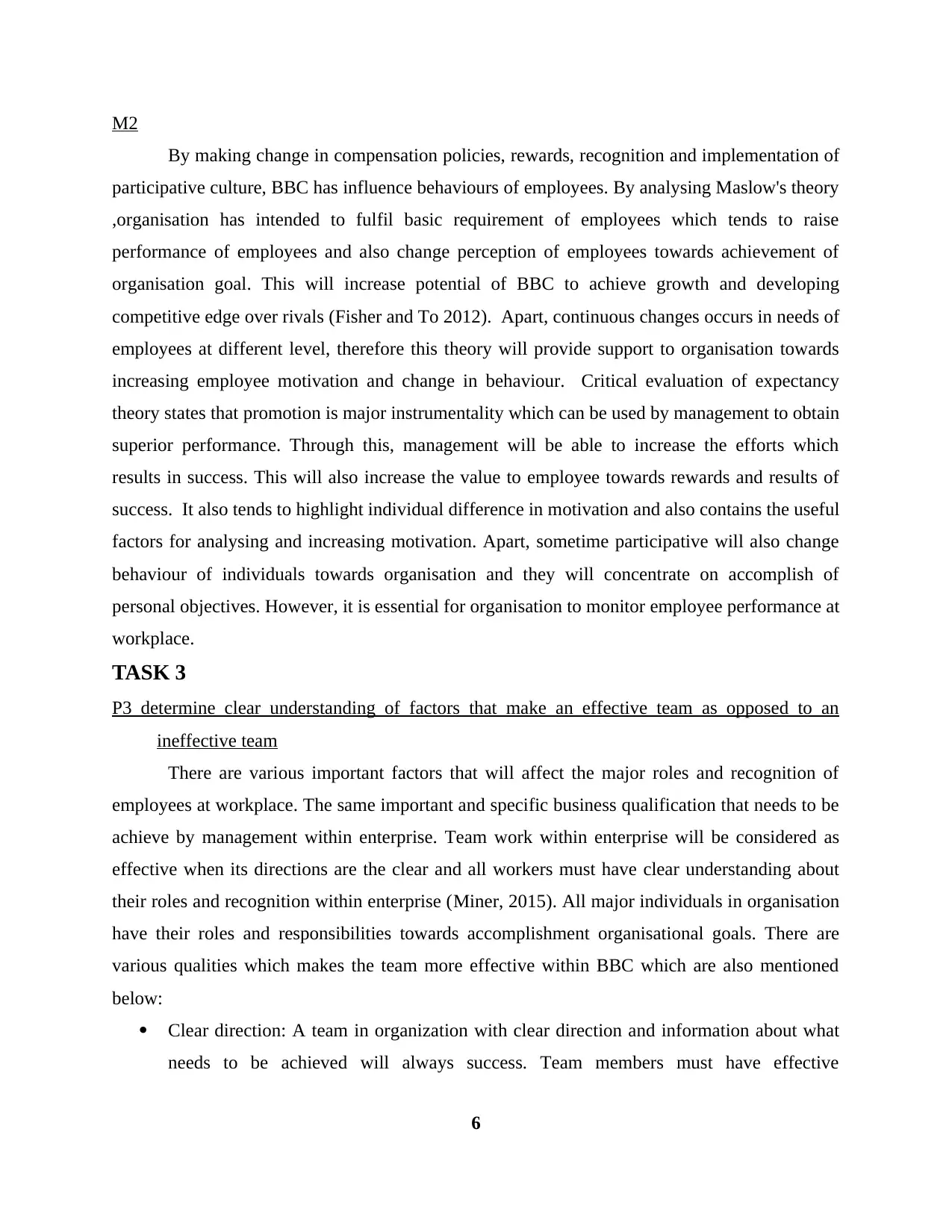
M2
By making change in compensation policies, rewards, recognition and implementation of
participative culture, BBC has influence behaviours of employees. By analysing Maslow's theory
,organisation has intended to fulfil basic requirement of employees which tends to raise
performance of employees and also change perception of employees towards achievement of
organisation goal. This will increase potential of BBC to achieve growth and developing
competitive edge over rivals (Fisher and To 2012). Apart, continuous changes occurs in needs of
employees at different level, therefore this theory will provide support to organisation towards
increasing employee motivation and change in behaviour. Critical evaluation of expectancy
theory states that promotion is major instrumentality which can be used by management to obtain
superior performance. Through this, management will be able to increase the efforts which
results in success. This will also increase the value to employee towards rewards and results of
success. It also tends to highlight individual difference in motivation and also contains the useful
factors for analysing and increasing motivation. Apart, sometime participative will also change
behaviour of individuals towards organisation and they will concentrate on accomplish of
personal objectives. However, it is essential for organisation to monitor employee performance at
workplace.
TASK 3
P3 determine clear understanding of factors that make an effective team as opposed to an
ineffective team
There are various important factors that will affect the major roles and recognition of
employees at workplace. The same important and specific business qualification that needs to be
achieve by management within enterprise. Team work within enterprise will be considered as
effective when its directions are the clear and all workers must have clear understanding about
their roles and recognition within enterprise (Miner, 2015). All major individuals in organisation
have their roles and responsibilities towards accomplishment organisational goals. There are
various qualities which makes the team more effective within BBC which are also mentioned
below:
Clear direction: A team in organization with clear direction and information about what
needs to be achieved will always success. Team members must have effective
6
By making change in compensation policies, rewards, recognition and implementation of
participative culture, BBC has influence behaviours of employees. By analysing Maslow's theory
,organisation has intended to fulfil basic requirement of employees which tends to raise
performance of employees and also change perception of employees towards achievement of
organisation goal. This will increase potential of BBC to achieve growth and developing
competitive edge over rivals (Fisher and To 2012). Apart, continuous changes occurs in needs of
employees at different level, therefore this theory will provide support to organisation towards
increasing employee motivation and change in behaviour. Critical evaluation of expectancy
theory states that promotion is major instrumentality which can be used by management to obtain
superior performance. Through this, management will be able to increase the efforts which
results in success. This will also increase the value to employee towards rewards and results of
success. It also tends to highlight individual difference in motivation and also contains the useful
factors for analysing and increasing motivation. Apart, sometime participative will also change
behaviour of individuals towards organisation and they will concentrate on accomplish of
personal objectives. However, it is essential for organisation to monitor employee performance at
workplace.
TASK 3
P3 determine clear understanding of factors that make an effective team as opposed to an
ineffective team
There are various important factors that will affect the major roles and recognition of
employees at workplace. The same important and specific business qualification that needs to be
achieve by management within enterprise. Team work within enterprise will be considered as
effective when its directions are the clear and all workers must have clear understanding about
their roles and recognition within enterprise (Miner, 2015). All major individuals in organisation
have their roles and responsibilities towards accomplishment organisational goals. There are
various qualities which makes the team more effective within BBC which are also mentioned
below:
Clear direction: A team in organization with clear direction and information about what
needs to be achieved will always success. Team members must have effective
6
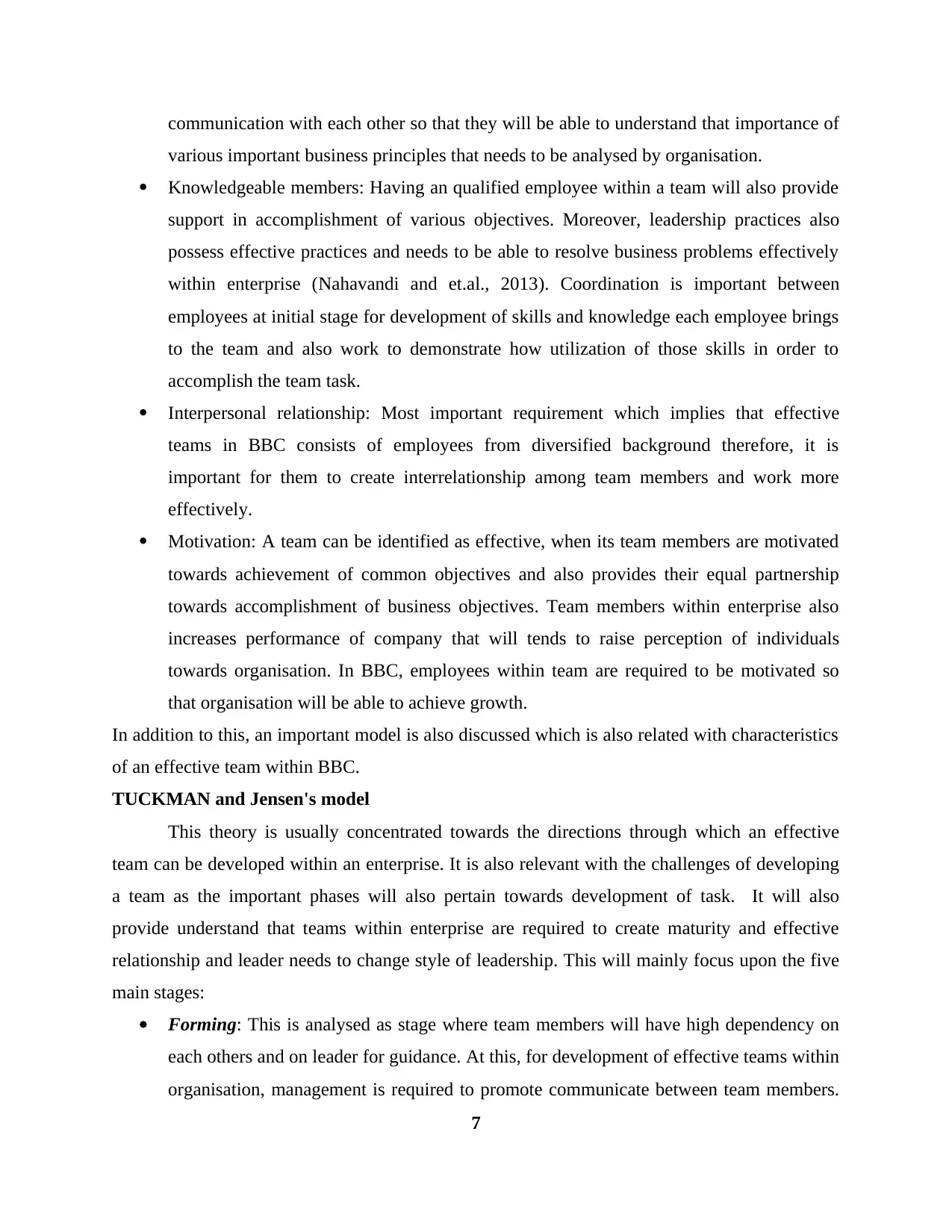
communication with each other so that they will be able to understand that importance of
various important business principles that needs to be analysed by organisation.
Knowledgeable members: Having an qualified employee within a team will also provide
support in accomplishment of various objectives. Moreover, leadership practices also
possess effective practices and needs to be able to resolve business problems effectively
within enterprise (Nahavandi and et.al., 2013). Coordination is important between
employees at initial stage for development of skills and knowledge each employee brings
to the team and also work to demonstrate how utilization of those skills in order to
accomplish the team task.
Interpersonal relationship: Most important requirement which implies that effective
teams in BBC consists of employees from diversified background therefore, it is
important for them to create interrelationship among team members and work more
effectively.
Motivation: A team can be identified as effective, when its team members are motivated
towards achievement of common objectives and also provides their equal partnership
towards accomplishment of business objectives. Team members within enterprise also
increases performance of company that will tends to raise perception of individuals
towards organisation. In BBC, employees within team are required to be motivated so
that organisation will be able to achieve growth.
In addition to this, an important model is also discussed which is also related with characteristics
of an effective team within BBC.
TUCKMAN and Jensen's model
This theory is usually concentrated towards the directions through which an effective
team can be developed within an enterprise. It is also relevant with the challenges of developing
a team as the important phases will also pertain towards development of task. It will also
provide understand that teams within enterprise are required to create maturity and effective
relationship and leader needs to change style of leadership. This will mainly focus upon the five
main stages:
Forming: This is analysed as stage where team members will have high dependency on
each others and on leader for guidance. At this, for development of effective teams within
organisation, management is required to promote communicate between team members.
7
various important business principles that needs to be analysed by organisation.
Knowledgeable members: Having an qualified employee within a team will also provide
support in accomplishment of various objectives. Moreover, leadership practices also
possess effective practices and needs to be able to resolve business problems effectively
within enterprise (Nahavandi and et.al., 2013). Coordination is important between
employees at initial stage for development of skills and knowledge each employee brings
to the team and also work to demonstrate how utilization of those skills in order to
accomplish the team task.
Interpersonal relationship: Most important requirement which implies that effective
teams in BBC consists of employees from diversified background therefore, it is
important for them to create interrelationship among team members and work more
effectively.
Motivation: A team can be identified as effective, when its team members are motivated
towards achievement of common objectives and also provides their equal partnership
towards accomplishment of business objectives. Team members within enterprise also
increases performance of company that will tends to raise perception of individuals
towards organisation. In BBC, employees within team are required to be motivated so
that organisation will be able to achieve growth.
In addition to this, an important model is also discussed which is also related with characteristics
of an effective team within BBC.
TUCKMAN and Jensen's model
This theory is usually concentrated towards the directions through which an effective
team can be developed within an enterprise. It is also relevant with the challenges of developing
a team as the important phases will also pertain towards development of task. It will also
provide understand that teams within enterprise are required to create maturity and effective
relationship and leader needs to change style of leadership. This will mainly focus upon the five
main stages:
Forming: This is analysed as stage where team members will have high dependency on
each others and on leader for guidance. At this, for development of effective teams within
organisation, management is required to promote communicate between team members.
7
⊘ This is a preview!⊘
Do you want full access?
Subscribe today to unlock all pages.

Trusted by 1+ million students worldwide
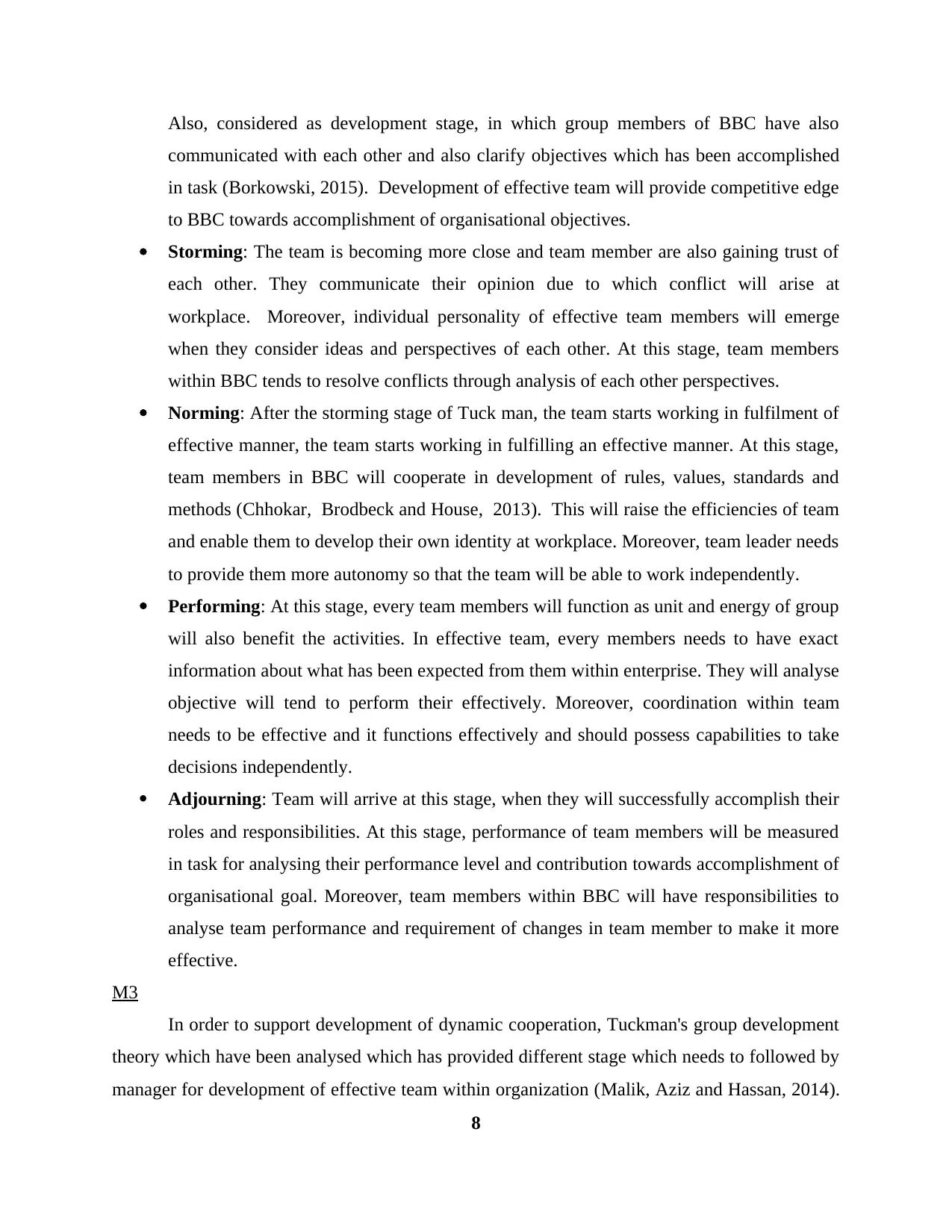
Also, considered as development stage, in which group members of BBC have also
communicated with each other and also clarify objectives which has been accomplished
in task (Borkowski, 2015). Development of effective team will provide competitive edge
to BBC towards accomplishment of organisational objectives.
Storming: The team is becoming more close and team member are also gaining trust of
each other. They communicate their opinion due to which conflict will arise at
workplace. Moreover, individual personality of effective team members will emerge
when they consider ideas and perspectives of each other. At this stage, team members
within BBC tends to resolve conflicts through analysis of each other perspectives.
Norming: After the storming stage of Tuck man, the team starts working in fulfilment of
effective manner, the team starts working in fulfilling an effective manner. At this stage,
team members in BBC will cooperate in development of rules, values, standards and
methods (Chhokar, Brodbeck and House, 2013). This will raise the efficiencies of team
and enable them to develop their own identity at workplace. Moreover, team leader needs
to provide them more autonomy so that the team will be able to work independently.
Performing: At this stage, every team members will function as unit and energy of group
will also benefit the activities. In effective team, every members needs to have exact
information about what has been expected from them within enterprise. They will analyse
objective will tend to perform their effectively. Moreover, coordination within team
needs to be effective and it functions effectively and should possess capabilities to take
decisions independently.
Adjourning: Team will arrive at this stage, when they will successfully accomplish their
roles and responsibilities. At this stage, performance of team members will be measured
in task for analysing their performance level and contribution towards accomplishment of
organisational goal. Moreover, team members within BBC will have responsibilities to
analyse team performance and requirement of changes in team member to make it more
effective.
M3
In order to support development of dynamic cooperation, Tuckman's group development
theory which have been analysed which has provided different stage which needs to followed by
manager for development of effective team within organization (Malik, Aziz and Hassan, 2014).
8
communicated with each other and also clarify objectives which has been accomplished
in task (Borkowski, 2015). Development of effective team will provide competitive edge
to BBC towards accomplishment of organisational objectives.
Storming: The team is becoming more close and team member are also gaining trust of
each other. They communicate their opinion due to which conflict will arise at
workplace. Moreover, individual personality of effective team members will emerge
when they consider ideas and perspectives of each other. At this stage, team members
within BBC tends to resolve conflicts through analysis of each other perspectives.
Norming: After the storming stage of Tuck man, the team starts working in fulfilment of
effective manner, the team starts working in fulfilling an effective manner. At this stage,
team members in BBC will cooperate in development of rules, values, standards and
methods (Chhokar, Brodbeck and House, 2013). This will raise the efficiencies of team
and enable them to develop their own identity at workplace. Moreover, team leader needs
to provide them more autonomy so that the team will be able to work independently.
Performing: At this stage, every team members will function as unit and energy of group
will also benefit the activities. In effective team, every members needs to have exact
information about what has been expected from them within enterprise. They will analyse
objective will tend to perform their effectively. Moreover, coordination within team
needs to be effective and it functions effectively and should possess capabilities to take
decisions independently.
Adjourning: Team will arrive at this stage, when they will successfully accomplish their
roles and responsibilities. At this stage, performance of team members will be measured
in task for analysing their performance level and contribution towards accomplishment of
organisational goal. Moreover, team members within BBC will have responsibilities to
analyse team performance and requirement of changes in team member to make it more
effective.
M3
In order to support development of dynamic cooperation, Tuckman's group development
theory which have been analysed which has provided different stage which needs to followed by
manager for development of effective team within organization (Malik, Aziz and Hassan, 2014).
8
Paraphrase This Document
Need a fresh take? Get an instant paraphrase of this document with our AI Paraphraser
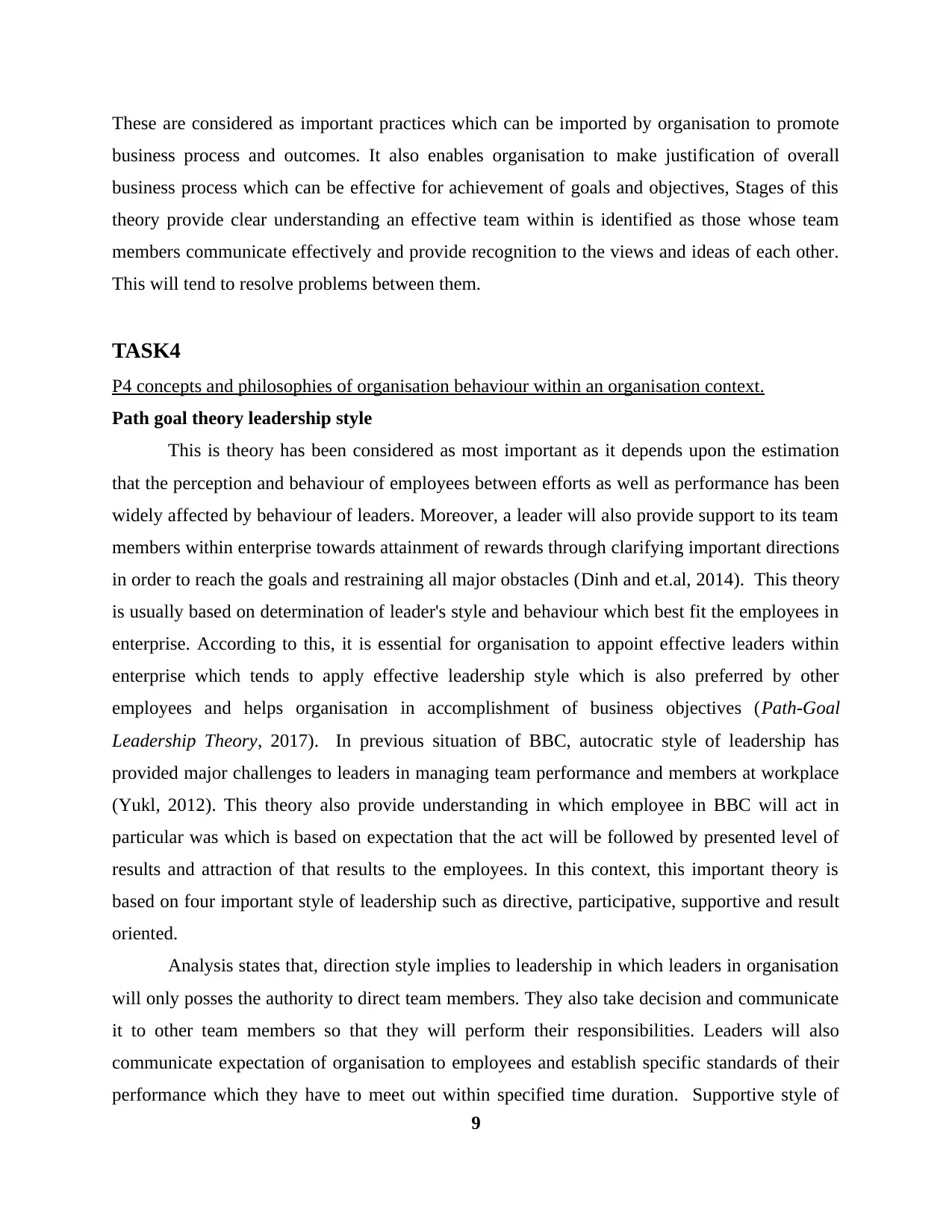
These are considered as important practices which can be imported by organisation to promote
business process and outcomes. It also enables organisation to make justification of overall
business process which can be effective for achievement of goals and objectives, Stages of this
theory provide clear understanding an effective team within is identified as those whose team
members communicate effectively and provide recognition to the views and ideas of each other.
This will tend to resolve problems between them.
TASK4
P4 concepts and philosophies of organisation behaviour within an organisation context.
Path goal theory leadership style
This is theory has been considered as most important as it depends upon the estimation
that the perception and behaviour of employees between efforts as well as performance has been
widely affected by behaviour of leaders. Moreover, a leader will also provide support to its team
members within enterprise towards attainment of rewards through clarifying important directions
in order to reach the goals and restraining all major obstacles (Dinh and et.al, 2014). This theory
is usually based on determination of leader's style and behaviour which best fit the employees in
enterprise. According to this, it is essential for organisation to appoint effective leaders within
enterprise which tends to apply effective leadership style which is also preferred by other
employees and helps organisation in accomplishment of business objectives (Path-Goal
Leadership Theory, 2017). In previous situation of BBC, autocratic style of leadership has
provided major challenges to leaders in managing team performance and members at workplace
(Yukl, 2012). This theory also provide understanding in which employee in BBC will act in
particular was which is based on expectation that the act will be followed by presented level of
results and attraction of that results to the employees. In this context, this important theory is
based on four important style of leadership such as directive, participative, supportive and result
oriented.
Analysis states that, direction style implies to leadership in which leaders in organisation
will only posses the authority to direct team members. They also take decision and communicate
it to other team members so that they will perform their responsibilities. Leaders will also
communicate expectation of organisation to employees and establish specific standards of their
performance which they have to meet out within specified time duration. Supportive style of
9
business process and outcomes. It also enables organisation to make justification of overall
business process which can be effective for achievement of goals and objectives, Stages of this
theory provide clear understanding an effective team within is identified as those whose team
members communicate effectively and provide recognition to the views and ideas of each other.
This will tend to resolve problems between them.
TASK4
P4 concepts and philosophies of organisation behaviour within an organisation context.
Path goal theory leadership style
This is theory has been considered as most important as it depends upon the estimation
that the perception and behaviour of employees between efforts as well as performance has been
widely affected by behaviour of leaders. Moreover, a leader will also provide support to its team
members within enterprise towards attainment of rewards through clarifying important directions
in order to reach the goals and restraining all major obstacles (Dinh and et.al, 2014). This theory
is usually based on determination of leader's style and behaviour which best fit the employees in
enterprise. According to this, it is essential for organisation to appoint effective leaders within
enterprise which tends to apply effective leadership style which is also preferred by other
employees and helps organisation in accomplishment of business objectives (Path-Goal
Leadership Theory, 2017). In previous situation of BBC, autocratic style of leadership has
provided major challenges to leaders in managing team performance and members at workplace
(Yukl, 2012). This theory also provide understanding in which employee in BBC will act in
particular was which is based on expectation that the act will be followed by presented level of
results and attraction of that results to the employees. In this context, this important theory is
based on four important style of leadership such as directive, participative, supportive and result
oriented.
Analysis states that, direction style implies to leadership in which leaders in organisation
will only posses the authority to direct team members. They also take decision and communicate
it to other team members so that they will perform their responsibilities. Leaders will also
communicate expectation of organisation to employees and establish specific standards of their
performance which they have to meet out within specified time duration. Supportive style of
9
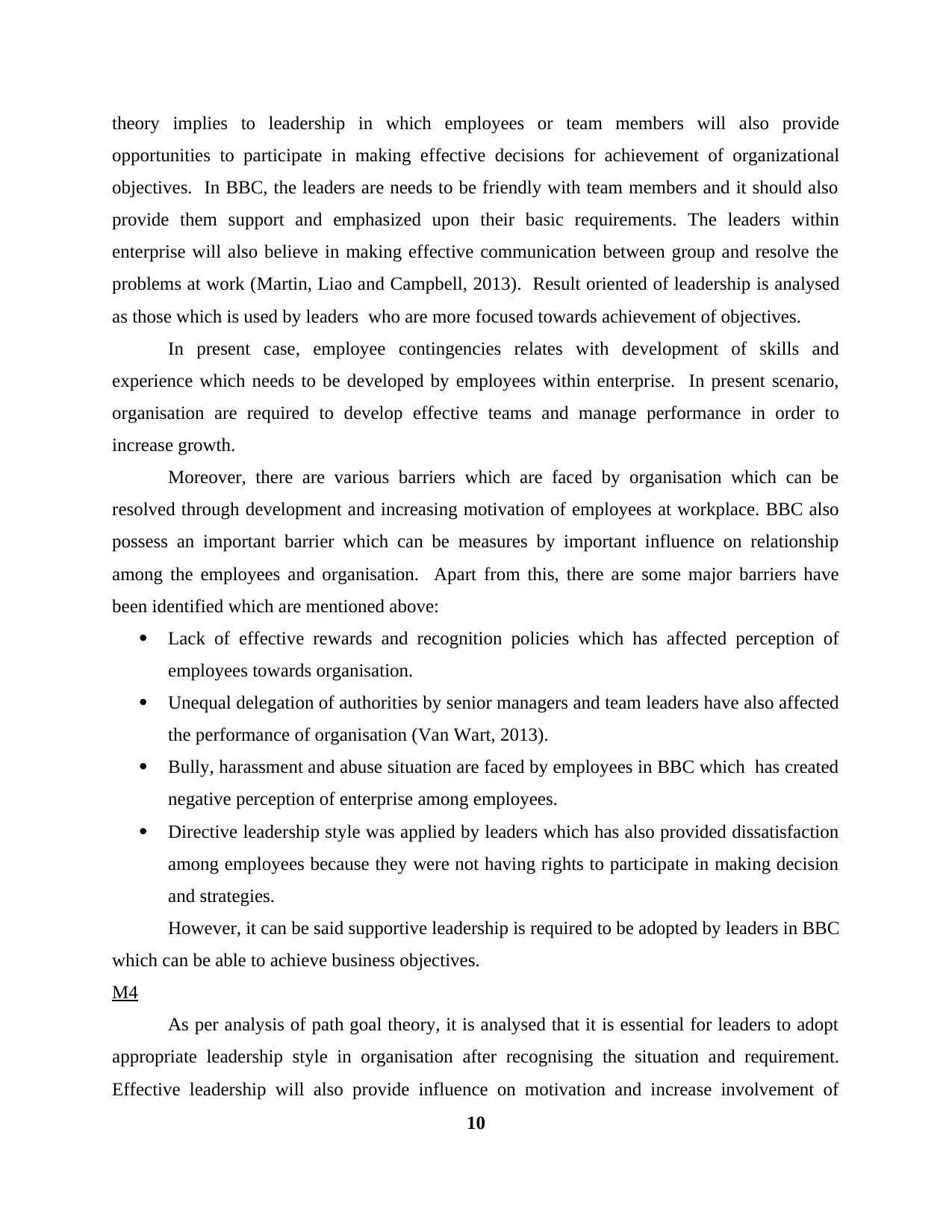
theory implies to leadership in which employees or team members will also provide
opportunities to participate in making effective decisions for achievement of organizational
objectives. In BBC, the leaders are needs to be friendly with team members and it should also
provide them support and emphasized upon their basic requirements. The leaders within
enterprise will also believe in making effective communication between group and resolve the
problems at work (Martin, Liao and Campbell, 2013). Result oriented of leadership is analysed
as those which is used by leaders who are more focused towards achievement of objectives.
In present case, employee contingencies relates with development of skills and
experience which needs to be developed by employees within enterprise. In present scenario,
organisation are required to develop effective teams and manage performance in order to
increase growth.
Moreover, there are various barriers which are faced by organisation which can be
resolved through development and increasing motivation of employees at workplace. BBC also
possess an important barrier which can be measures by important influence on relationship
among the employees and organisation. Apart from this, there are some major barriers have
been identified which are mentioned above:
Lack of effective rewards and recognition policies which has affected perception of
employees towards organisation.
Unequal delegation of authorities by senior managers and team leaders have also affected
the performance of organisation (Van Wart, 2013).
Bully, harassment and abuse situation are faced by employees in BBC which has created
negative perception of enterprise among employees.
Directive leadership style was applied by leaders which has also provided dissatisfaction
among employees because they were not having rights to participate in making decision
and strategies.
However, it can be said supportive leadership is required to be adopted by leaders in BBC
which can be able to achieve business objectives.
M4
As per analysis of path goal theory, it is analysed that it is essential for leaders to adopt
appropriate leadership style in organisation after recognising the situation and requirement.
Effective leadership will also provide influence on motivation and increase involvement of
10
opportunities to participate in making effective decisions for achievement of organizational
objectives. In BBC, the leaders are needs to be friendly with team members and it should also
provide them support and emphasized upon their basic requirements. The leaders within
enterprise will also believe in making effective communication between group and resolve the
problems at work (Martin, Liao and Campbell, 2013). Result oriented of leadership is analysed
as those which is used by leaders who are more focused towards achievement of objectives.
In present case, employee contingencies relates with development of skills and
experience which needs to be developed by employees within enterprise. In present scenario,
organisation are required to develop effective teams and manage performance in order to
increase growth.
Moreover, there are various barriers which are faced by organisation which can be
resolved through development and increasing motivation of employees at workplace. BBC also
possess an important barrier which can be measures by important influence on relationship
among the employees and organisation. Apart from this, there are some major barriers have
been identified which are mentioned above:
Lack of effective rewards and recognition policies which has affected perception of
employees towards organisation.
Unequal delegation of authorities by senior managers and team leaders have also affected
the performance of organisation (Van Wart, 2013).
Bully, harassment and abuse situation are faced by employees in BBC which has created
negative perception of enterprise among employees.
Directive leadership style was applied by leaders which has also provided dissatisfaction
among employees because they were not having rights to participate in making decision
and strategies.
However, it can be said supportive leadership is required to be adopted by leaders in BBC
which can be able to achieve business objectives.
M4
As per analysis of path goal theory, it is analysed that it is essential for leaders to adopt
appropriate leadership style in organisation after recognising the situation and requirement.
Effective leadership will also provide influence on motivation and increase involvement of
10
⊘ This is a preview!⊘
Do you want full access?
Subscribe today to unlock all pages.

Trusted by 1+ million students worldwide
1 out of 15
Related Documents
Your All-in-One AI-Powered Toolkit for Academic Success.
+13062052269
info@desklib.com
Available 24*7 on WhatsApp / Email
![[object Object]](/_next/static/media/star-bottom.7253800d.svg)
Unlock your academic potential
Copyright © 2020–2026 A2Z Services. All Rights Reserved. Developed and managed by ZUCOL.



